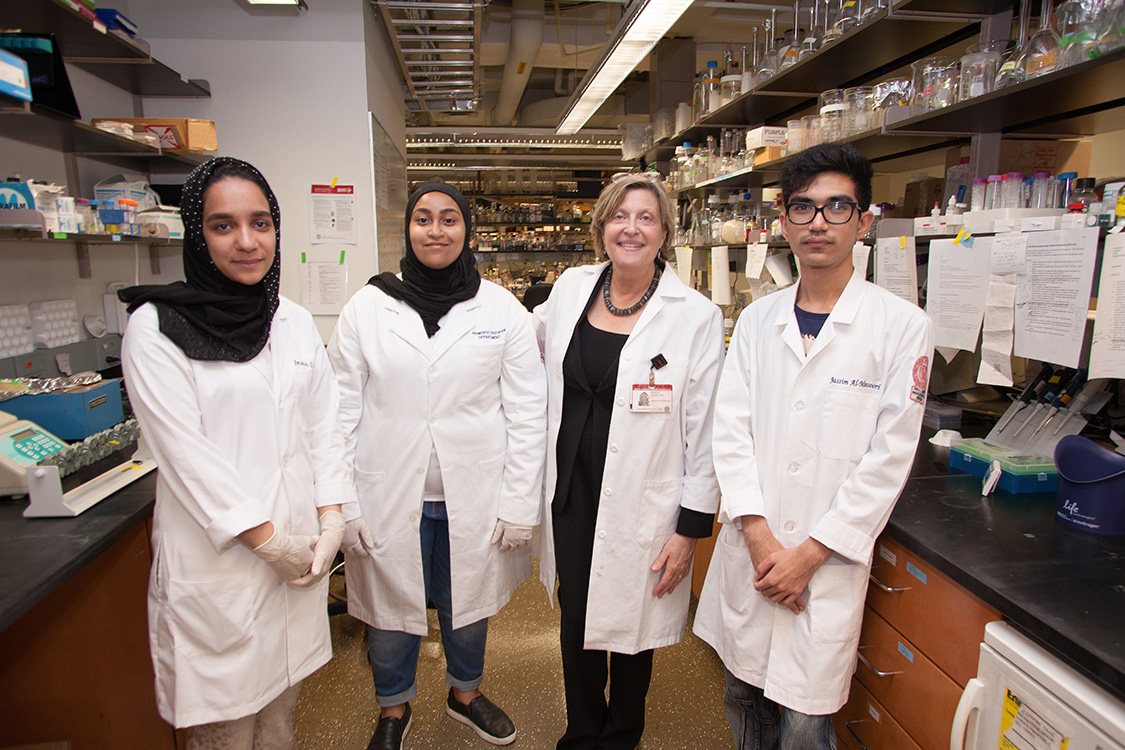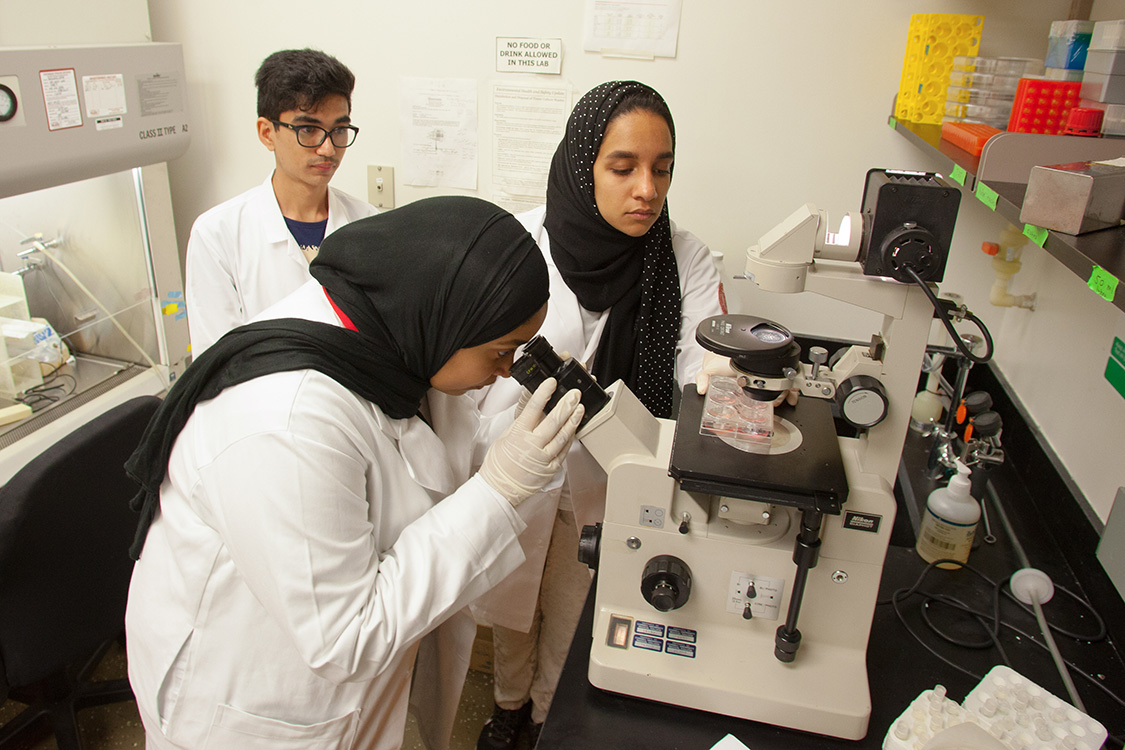Cornell builds bridges with Qatari 'doctors of the future'
By Susan Kelley

The Ithaca campus and Weill Cornell Medicine-New York welcomed three special young guests recently: high school students from Qatar, visiting the United States for the first time to get a sneak peek into the world of academic medicine.
“I never really liked biology until yesterday,” said Jassim Al-Mansoori after a lecture on modern biology by Mark Stephen Roberson, professor of physiology in Ithaca and chair of the Department of Biomedical Sciences. “It was fascinating, all the gene mutations and gene editing we were talking about,” Al-Mansoori added.
Imaneh Qaedi’s favorite part of the Ithaca trip was visiting the lab of Siu Sylvia Lee, professor of molecular biology and genetics, where the students learned about the lab’s genetic research on the nematode C. elegans. Qaedi was astounded to learn that the researchers can freeze the worms, take a break from their research – even for months at a time – and the worms, when thawed, will still be alive. “I was shocked. I believe it eases a lot of difficulties researchers face,” said Qaedi, who hopes to become a doctor.
The students were each recipients of a Qatar Doctors of the Future scholarship, which fully funds a two-week trip to Weill Cornell Medicine-New York to learn about academic medicine from faculty and researchers.
Dr. Rachid Bendriss, assistant dean of student recruitment, outreach and foundation programs at Weill Cornell Medicine-Qatar explained: “The purpose of the Qatar Doctors of the Future Scholarship Program is to expose Qatar high school students to medical research and provide them with an opportunity to explore the medical field.” The winning team, Aljohara Al-Marri, Fatima Al-Naimi, Jassim Al-Mansoori and Imaneh Qaedi, had won an essay competition earlier this year, writing about the impact of technology on medicine. (Al-Naimi was unable to make the trip to the United States.)
Run by the Office of Student Recruitment and Outreach in Qatar since 2008, the program yields great results as proven by the number of winners currently enrolled in Cornell’s medical program in Qatar, Bendriss said.
“Delivered in Doha, New York City and Ithaca, this program demonstrates the great collaboration that exists between Weill Cornell Medicine-New York, Cornell University and Weill Cornell Medicine-Qatar,” he added.
In past years, the scholarship recipients spent the two weeks at Weill Cornell Medicine-New York. This year’s winners ventured to Ithaca as well.

The design of the Ithaca pilot module was the brainchild of the students’ host in Ithaca, Krystyna Golkowska, associate professor of English and director of English as a Second Language and writing seminars in the premedical program at Weill Cornell Medicine-Qatar. “For me, it was a no-brainer that these kids should be exposed to what an undergraduate education is like, see Ithaca and the main campus, and maybe even relax a little bit before going to New York City,” she said.
The students spent July 17-22 in Ithaca. In the afternoons, they explored the campus and soaked up experiential learning at Cornell Plantations, Cornell Lab of Ornithology, Museum of the Earth, Taughannock Falls and Robert Treman State Park.
Mornings were spent on formal instruction. Golkowska lectured on qualitative and quantitative research topics, from how to record research results and read scientific articles to the importance of intercultural communication. Al-Marri, who dreams of a career as a neurologist, was impressed with the emphasis on critical thinking. “It’s something we don’t focus on so much in Qatar,” she said.
Golkowska also emphasized to the students the importance of reflecting on their experiences and observing themselves interacting with a new environment. “We stress building bridges, between Doha and Ithaca and New York City, between Qatar and the United States, but also between their high school education and college, and between different cultures,” she said.
David Robertshaw, professor emeritus of physiology, introduced the students and their escorts to medical research at Cornell and took them on trips to labs and clinical areas of the College of Veterinary Medicine.
The students spent the second week at Weill Cornell Medicine-New York, at the labs of Randi Silver, associate dean of the Weill Cornell Graduate School of Medical Sciences and professor of physiology and biophysics, and Stefan Worgall, distinguished professor of pediatric pulmonology and chief of the Division of Pediatric Pulmonology, Allergy and Immunology.
In Silver’s lab, the students studied chronic lung disease of prematurity, a disease that affects the under-developed lungs of premature infants. Using the tools of cell biology, cell culture and biochemistry under the supervision of lab manager Barbara Summers and graduate student Ally Savage, the students isolated membrane particles (exosomes) from cultured human mast cells and determined if mast cell proteins in the particles could be regulated by oxygen levels. They also studied whether mast cell particles can be transferred to other types of cells, such as fibroblasts. Under the direction of Anurag Sharma, an instructor of pediatrics in Worgall’s lab, they observed how viruses can have a dire effect on airway cells.
At the end of the week, the students presented their results to the lab teams, putting their findings in the context of chronic lung disease of prematurity and asthma.
“This was their first exposure to a biomedical research lab, and they were totally engaged,” said Silver. “The experience taught them to appreciate the importance of bench science and how it can impact the bedside.”
The student also visited a cadaver lab – Qaedi’s first time in a room with a deceased body – and toured NewYork-Presbyterian/Weill Cornell Medical Center, which was Qaedi and Al-Mansoori’s favorite experience. “It was the first time I visited a hospital for the purpose of learning. I felt like a real medical student,” Qaedi said.
“Being able to use a stethoscope to compare patients’ normal and abnormal lungs is something you can’t learn while sitting in a classroom, so I’m glad I had this opportunity,” said Al-Mansoori.
Qaedi participated in the essay competition because she thought the U.S. trip might help her learn more about medical training, especially at Weill Cornell Medicine. Her prediction was correct, she said.
“It was such a short period of time, but I learned a lot of information and lab skills that will definitely help me in my future studies,” Qaedi said. “And meeting all these inspiring people made my goal of being a doctor who graduates from Weill Cornell Medicine even stronger.”
Media Contact
Get Cornell news delivered right to your inbox.
Subscribe